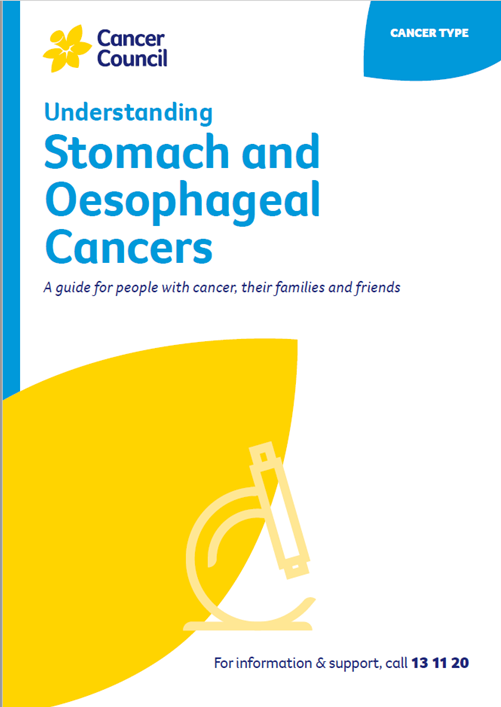- Home
- Oesophageal cancer
- Diagnosis
- Your health care team
Your health care team
Your GP will assess your symptoms and arrange the first tests to check your general health. You will usually be referred to a specialist such as a gastroenterologist or an upper gastrointestinal surgeon for an endoscopy and further tests.
If you are diagnosed with oesophageal cancer, the specialist will consider treatment options. Often these will be discussed with other health professionals at what is known as a multidisciplinary team (MDT) meeting.
During and after treatment, you will see a range of health professionals who specialise in different aspects of your care. The most common health professionals are listed below. You won’t necessarily see all these people.
Health professionals you may see
| gastroenterologist | diagnoses and treats digestive system disorders; may perform endoscopies and insert feeding tubes |
| upper gastrointestinal surgeon | diagnoses and performs surgery for diseases of the upper digestive system (such as cancer); performs endoscopies and inserts feeding tubes |
| medical oncologist | treats cancer with drug therapies such as chemotherapy, targeted therapy and immunotherapy (systemic treatment) |
| radiation oncologist | treats cancer by prescribing and overseeing a course of radiation therapy |
| radiation therapist | plans and delivers radiation therapy |
| cancer care coordinator | coordinates your care, liaises with MDT members and supports you and your family throughout treatment; care may also be coordinated be a clinical nurse consultant (CNC), nurse consultant or clinical nurse specialist (CNS) |
| nurse | administers drugs and provides care, information and support throughout treatment |
| dietitian | helps with nutrition concerns and recommends changes to diet during treatment and recovery |
| physiotherapist, exercise physiologist | help with restoring movement and mobility, and preventing further injury |
| speech pathologist | helps with communication and swallowing after treatment |
| social worker | links you to support services and helps with emotional and practical issues |
| counsellor, psychologist | use evidence-based strategies to help you manage emotional conditions, usually in the long term |
| palliative care team | work closely with the GP and cancer specialists to help control symptoms and maintain quality of life |
→ READ MORE: Oesophageal cancer treatment
More resources
Prof David I Watson, Matthew Flinders Distinguished Professor of Surgery, Flinders University, and Senior Consultant Surgeon, Oesophago-Gastric Surgery Unit, Flinders Medical Centre, SA; Prof Bryan Burmeister, Senior Radiation Oncologist, GenesisCare Fraser Coast and Hervey Bay Hospital, QLD; Kieran Cahill, Consumer; Jessica Jong, Clinical Dietitian, Upper GI and Hepatobiliary Services, Peter MacCallum Cancer Centre, VIC; John Leung, Consumer; Prof Rajvinder Singh, Professor of Medicine, University of Adelaide, and Director, Gastroenterology Department and Head of Endoscopy, Lyell McEwin Hospital, SA; Dr Sarah Sutherland, Medical Oncologist, Chris O’Brien Lifehouse, NSW; Paula Swannock, Upper GI Cancer Nurse Consultant, St Vincent’s Hospital Melbourne, VIC; Rebecca Yeoh, 13 11 20 Consultant, Cancer Council Queensland.
View the Cancer Council NSW editorial policy.
View all publications or call 13 11 20 for free printed copies.

